
Today, of course, is Labor Day in the U.S. and Canada, celebrated each year on the first Monday in September since 1894, at least federally. Most countries, more than 80, celebrate something similar on May 1, and a few others on different days. In the Bahamas, for example, it’s the first Friday in June and in New Zealand, it’s celebrated the fourth Monday in October, while in Australia it’s different for every territory there. But the genesis is the same, to “honor the American labor movement and the contributions that workers have made to the strength, prosperity, and well-being of their country.”
According to Wikipedia, “Labor Day was promoted by the Central Labor Union and the Knights of Labor, who organized the first parade in New York City. After the Haymarket Massacre in Chicago on May 4, 1886, U.S. President Grover Cleveland feared that commemorating Labor Day on May 1 could become an opportunity to commemorate the affair. Therefore, in 1887, the United States holiday was established in September to support the Labor Day that the Knights favored.” And you can read more about it at the Department of Labor.
Unlike today, when labor movements, and particularly unions, are demonized in the press and by the right-wing political machine, most people supported labor in some fashion for the very simply reason that a majority of people were part of the labor force. Today, thanks to effective propaganda, many people vote against their own interests. But that was not yet the case when Prohibition took effect in 1920. So many people in the labor force who were very unhappy about not being able to drink a beer after eight hours of back-breaking work started agitating for a repeal of prohibition, in some cases right from the start, since it became abundantly clear very quickly that a working life without the reward of a cold beer was going to suck.
Even before the 18th Amendment was to take effect on January 17, 1920, a previous measure passed by Congress, the Wartime Prohibition Act banned “the sale of alcoholic beverages having an alcohol content of greater than 2.75%” beginning on June 30, 1919.” The measure supposedly was “intended to save grain for the war effort,” but it actually “was passed after the armistice ending World War I was signed on November 11, 1918.” Since July 1st was the first day after alcohol was banned under the Wartime Prohibition Act, that day became known as the “Thirsty-First.”
So labor organizations in New York City began making plans to oppose and protest Prohibition, creating pins bearing their slogan “No Beer, No Work.”
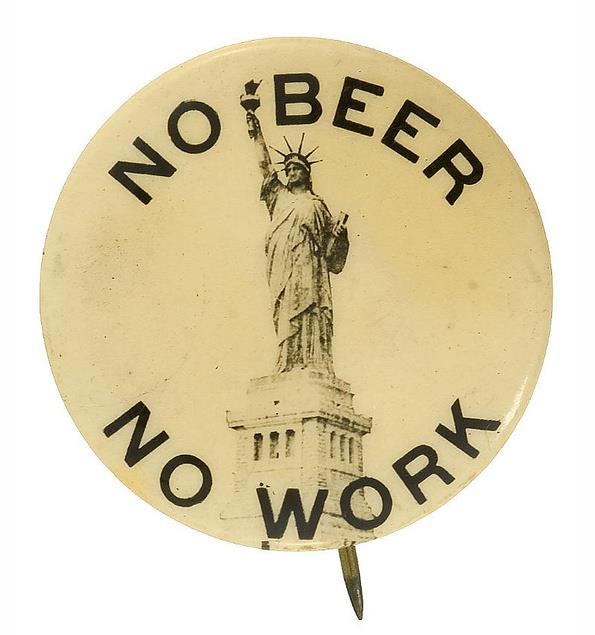
In addition, they planned a walk-out for July 1 of 1919, which was reported in the New York Times on February 8, 1919.
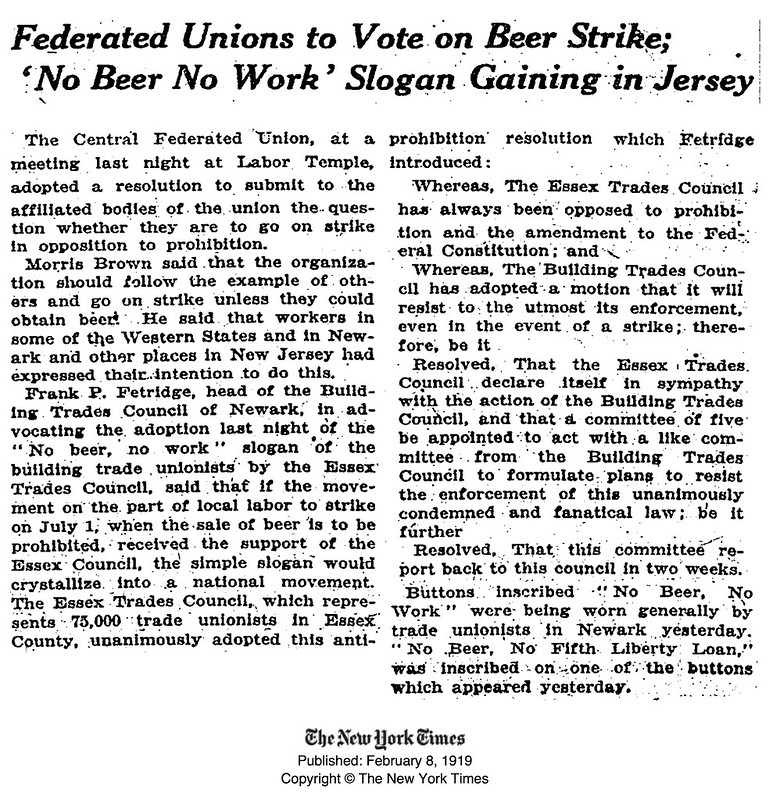
The next day, February 9, 1919, the story was picked up in Chicago and ran on the front page of The Evening World.

The news even made it as far as Australia’s Northern Territory Times and Gazette of Darwin, which ran the story on April 19, 1919 (reporting on events of February 8th and 9th):
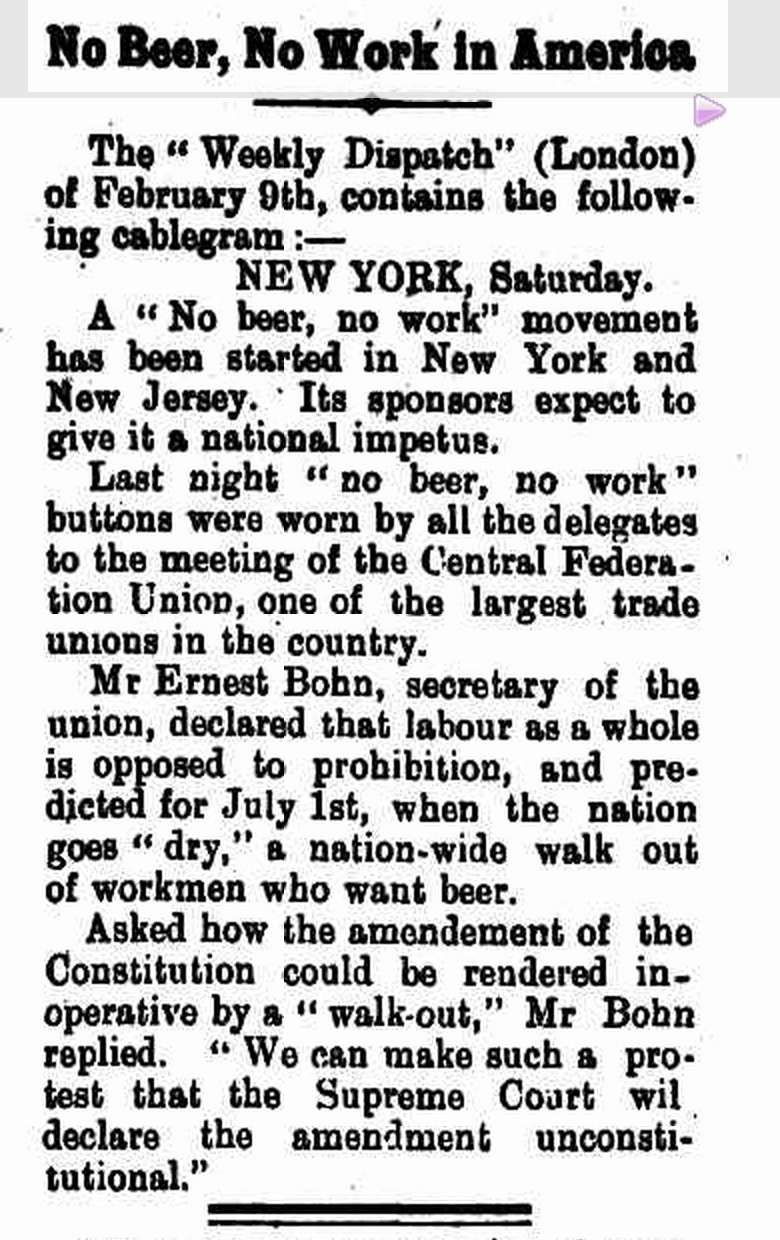
A “No beer, no work” movement has been started in New York and New Jersey. Its sponsors expect to give it a national impetus. Last night “no beer, no work” buttons were worn by all the delegates to the meeting of the Central Federation Union, one of the largest trade unions in the country. Mr. Ernest Bohn, secretary of the union, declared that labour as a whole is opposed to prohibition, and predicted for July 1st, when the nation goes “dry,” a nation-wide walk out of workmen who want beer. Asked how the amendment of the Constitution could be rendered inoperative by a ” walk-out,” Mr Bohn replied. “We can make such a protest that the Supreme Court wilt declare the amendment unconstitutional.”
But not everyone in labor agreed, as evidenced by this article in New Jersey’s Poverty Bay Herald on May 3, 1919, where 400 union delegates in the Garden State came out against the strike, although they agreed that Prohibition was a bad idea.
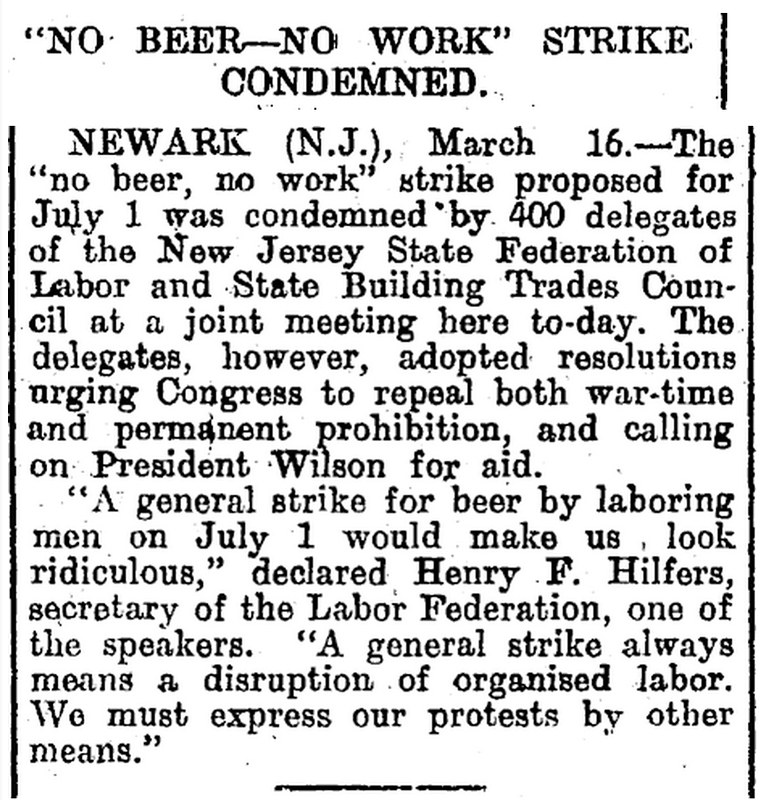
But there’s not much more about these efforts in New York that I could find. I did find this paragraph, by a Columbia history student, who in his junior year received a research grant, the Edwin Robbins Prize, and used it to do his senior thesis:
“New York Organized Labor and Prohibition Resistance: The ‘No Beer, No Work’ Movement of 1919.” A forgotten moment in labor history, it was a fascinating intersection of culture, gender, and class, examining the untidy boundary between “economic” and “social” life. Some local trade-unionists co-opted a catchy slogan, “No Beer, No Work,” with the intent of fomenting a national general strike, attempting to save the saloon, galvanize class consciousness, and lead workers into a labor party. The strike more than failed; it never occurred.
Perhaps more curiously, and what started this, is I discovered that more than one person took the great slogan “No Beer, No Work,” and wrote a song about it, using it as the title. The first I found was written in 1919, by Sammy Edwards.
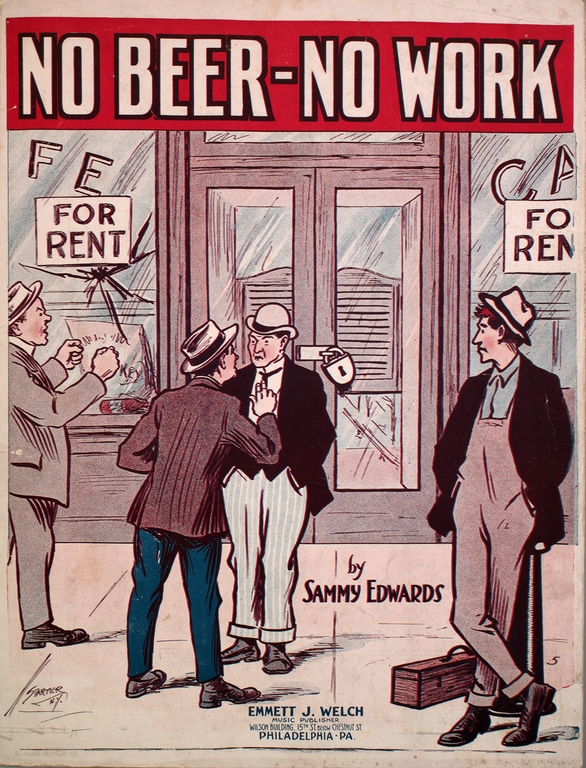
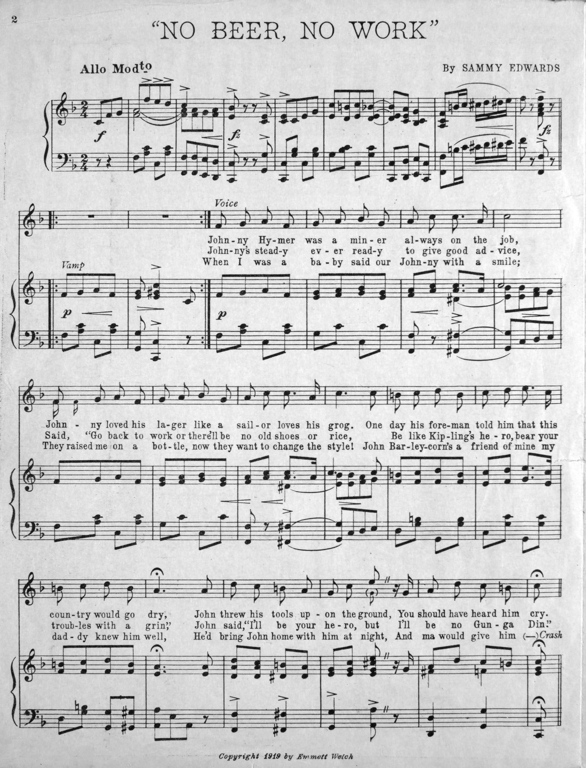
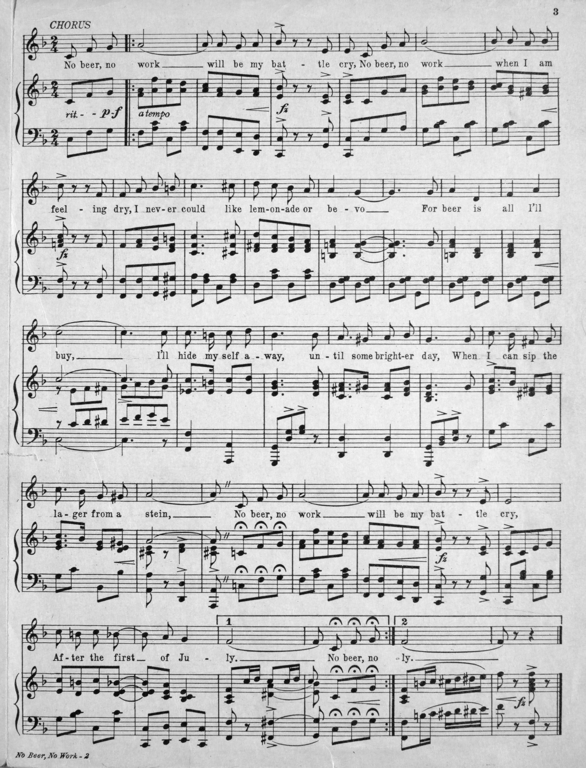
And here are the lyrics to NO BEER, NO WORK, by Sammy Edwards, 1919:
1. Johnny Hymer was a miner, always on the job.
Johnny loved his lager like a sailor loves his grog.
One day, his foreman told him that this country would go dry.
John threw his tools upon the ground. You should have heard him cry:
CHORUS: “No beer, no work” will be my battle cry.
“No beer, no work” when I am feeling dry.
I never could like lemonade or bevo, for beer is all I’ll buy.
I’ll hide my self away
Until some brighter day
When I can sip the lager from a stein.
“No beer, no work” will be my battle cry
After the first of July.
2. Johnny’s steady, ever ready to give good advice,
Said, “Go back to work or there’ll be no old shoes or rice.
Be like Kipling’s hero. Bear your troubles with a grin.”
John said, “I’ll be your hero, but I’ll be no Gunga Din.”
3. “When I was a baby,” said our Johnny with a smile,
“They raised me on a bottle. Now they want to change the style.
John Barleycorn’s a friend of mine. My daddy knew him well.
He’d bring John home with him at night and ma would give him —.
Then the very same year, another song was published by Martin Ballmann, with lyrics by Anna Ballmann and Theodore Philipp, also with the title “No Beer, No Work.” Ballman’s version was published in Chicago, and is completely different than Edwards’, apart from the title, of course.
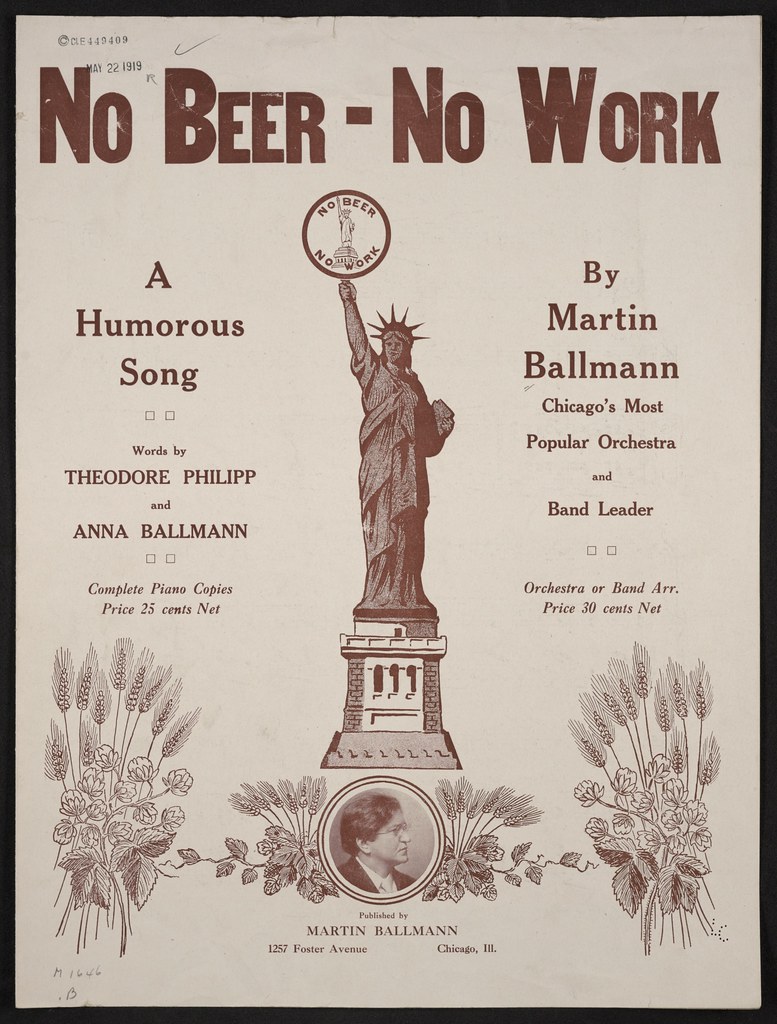
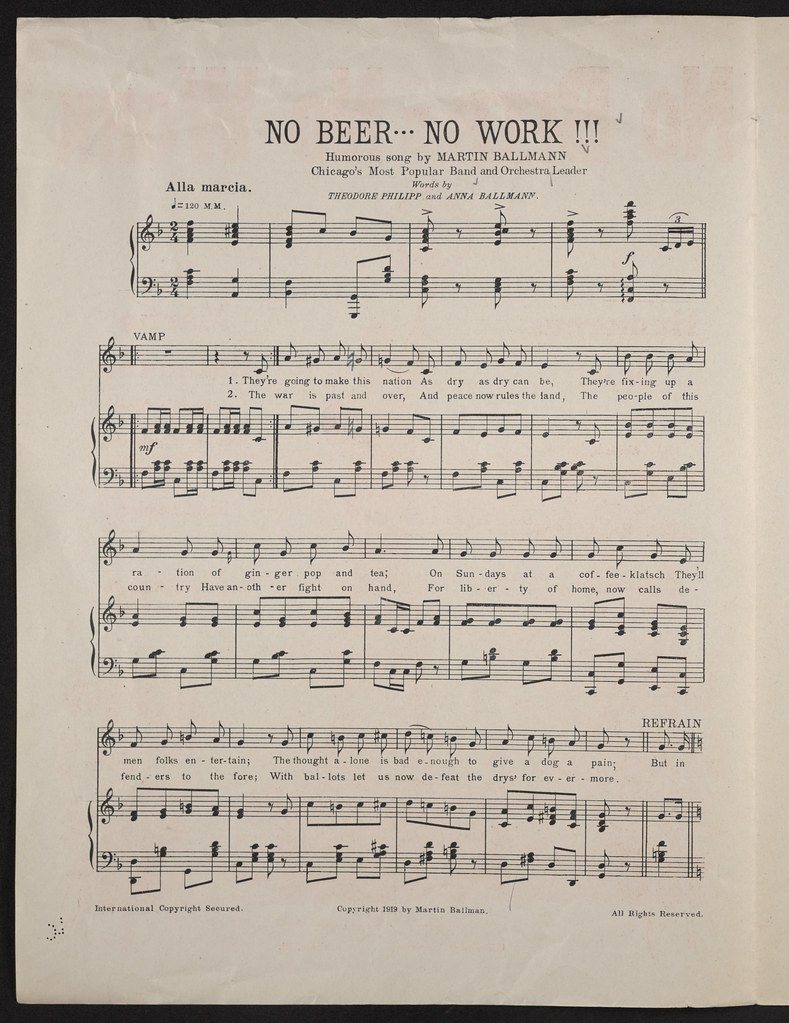
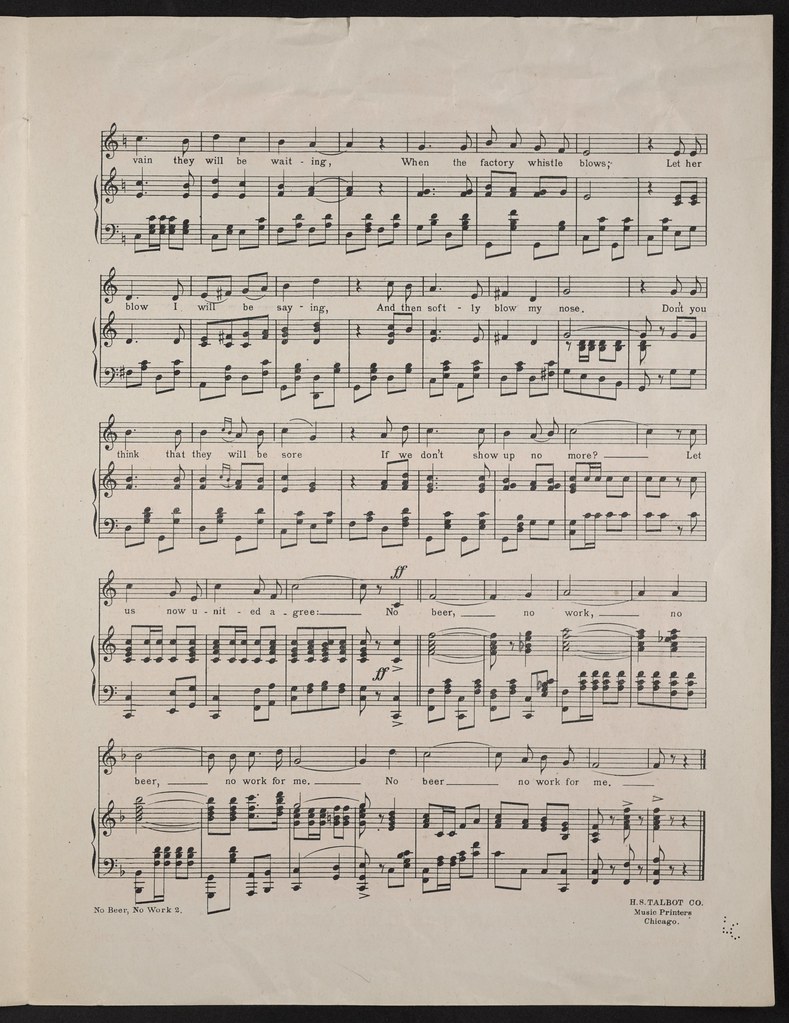
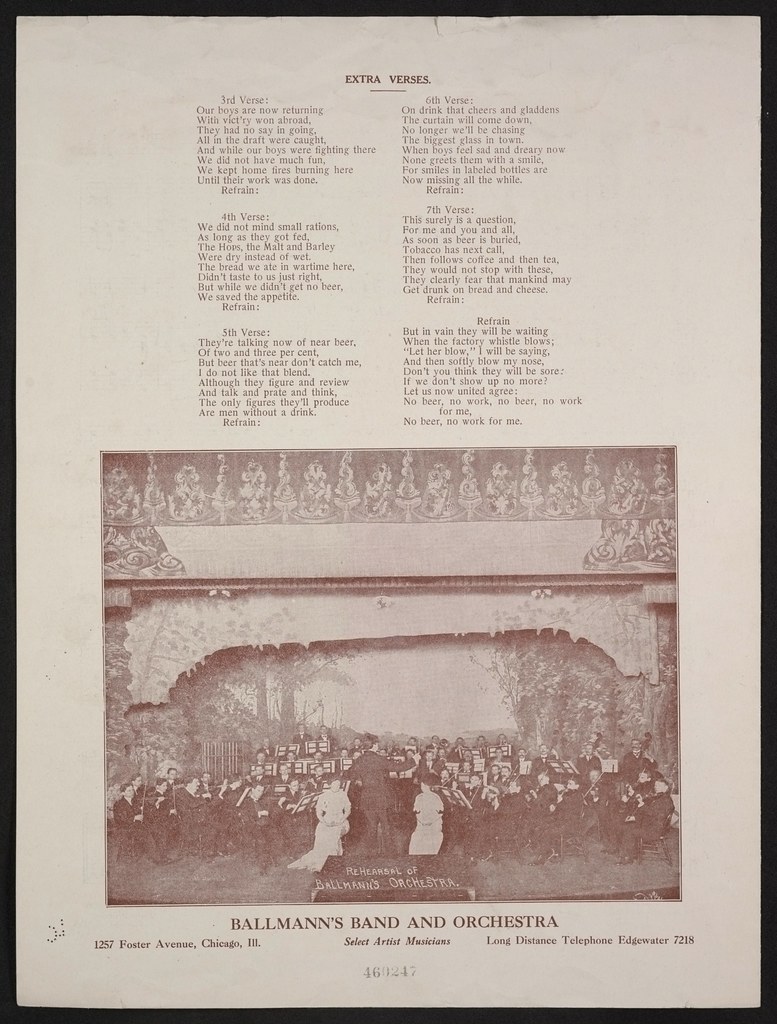
And lastly, music-wise at least, again in early 1919 (February 26 the paper is stamped), “singing character comedian” Sam Marley created original novelty lyrics for a song he called … wait for it … “No Beer, No Work.” His typed lyrics can be found in the collection of the Library of Congress.
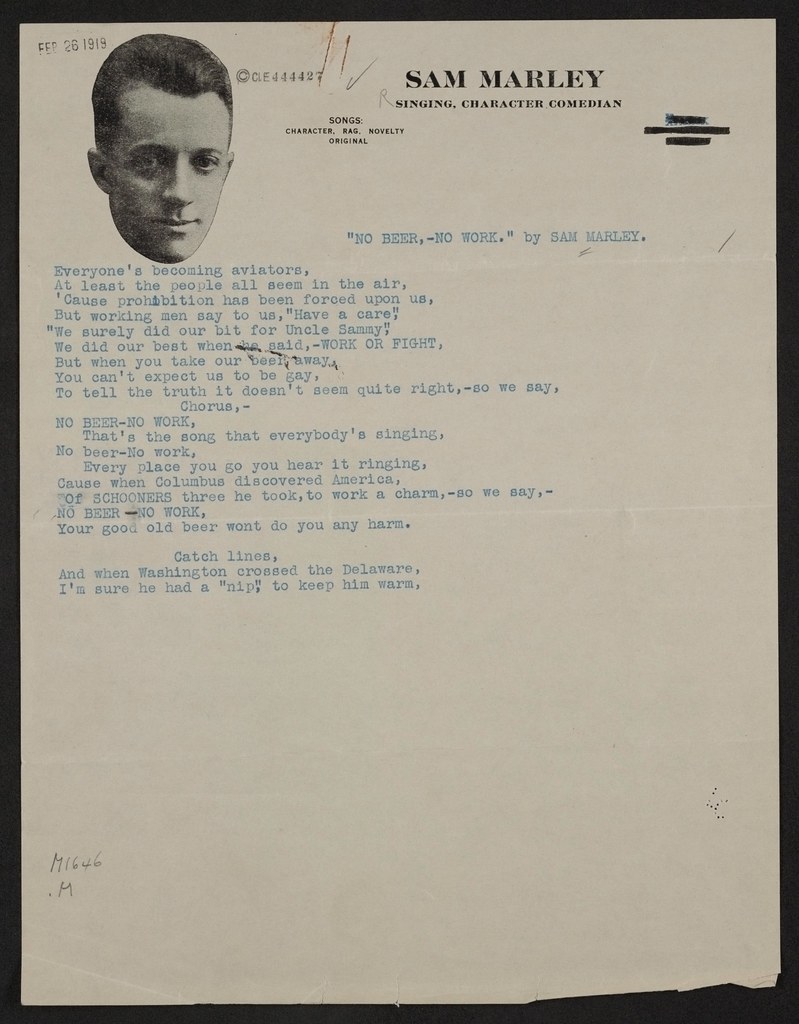
Here’s a political cartoon originally from “The American Issue” of Westerville, Ohio, published August 19, 1919, drawn by an artist named Henderson.
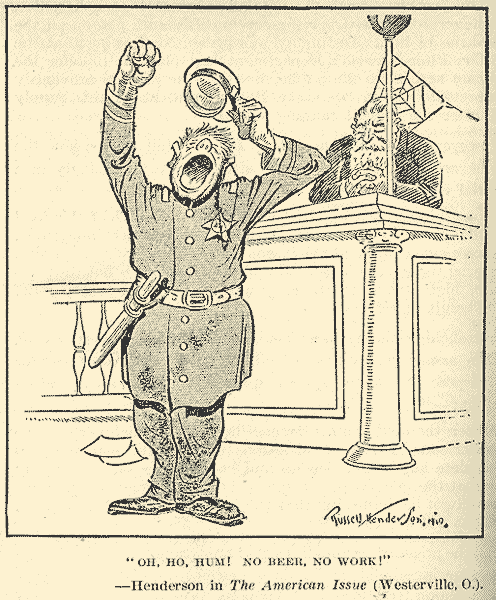
And finally, American author and poet Ellis Parker Butler, wrote a poem in 1919 also using labor’s slogan as the title, which was published in the magazine “Snappy Stories.” Butler’s poem was a parody of Henry Wadsworth Longfellow’s Excelsior.
No Beer, No Work
The shades of night was fallin’ slow
As through New York a guy did go
And nail on ev’ry barroom door
A card that this here motter bore:
‘No beer, no work.’
His brow was sad, his mouth was dry;
It was the first day of July,
And where, all parched and scorched it hung,
These words was stenciled on his tongue:
‘No beer, no work.’
‘Oh, stay,’ the maiden said, ‘and sup
This malted milk from this here cup.’
A shudder passed through that there guy,
But with a moan he made reply:
‘No beer, no work.’
At break of day, as through the town
The milkman put milk bottles down,
Onto one stoop a sort of snore
Was heard, and then was heard no more—
‘No beer, no work.’
The poor old guy plumb dead was found
And planted in the buryin’ ground,
Still graspin’ in his hand of ice
Them placards with this sad device:
‘No beer, no work.’
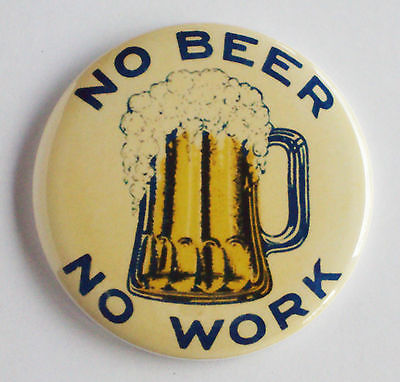
To which I can only add. Happy Labor Day!

Interesting. This means that national prohibition of alcohol, of a sort, began nearly seven months before the 18th Amendment even went into effect. Good research, Jay.
If, in 1919, Organized Labor had the political clout it had after WWII (during which FDR ordered coal miners back to work after they went out on strike) & up to the Reagunzap era, they might have been able to pull it off. But the Union honchos were smart enough to realize that the Supreme Court of that day was far more conservative than the ones from the latter part of Ike’s term thru the 80’s.